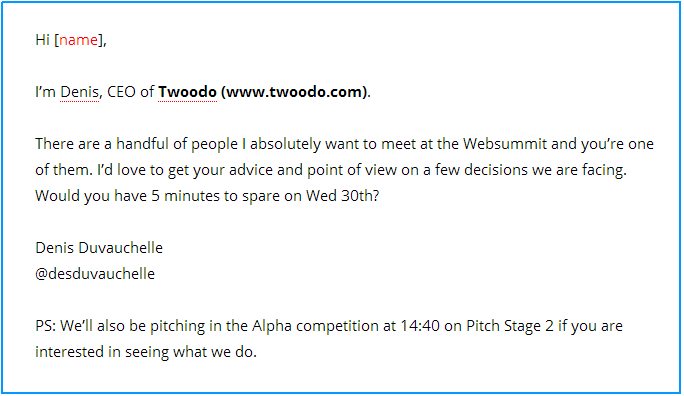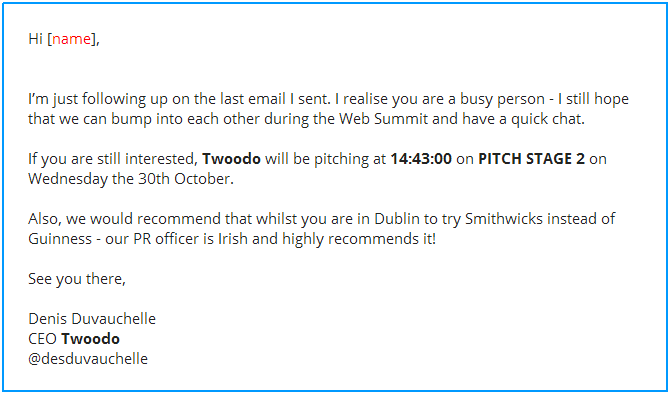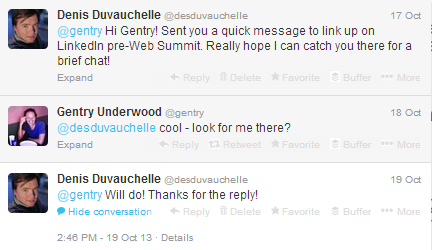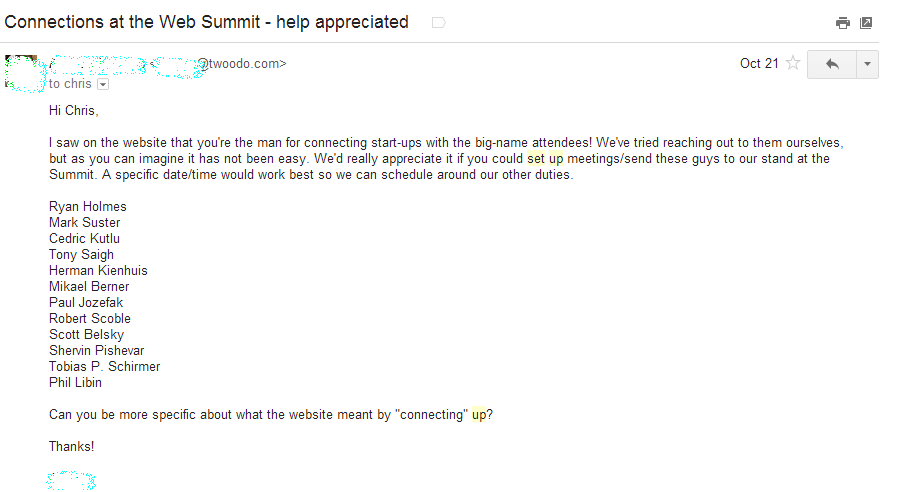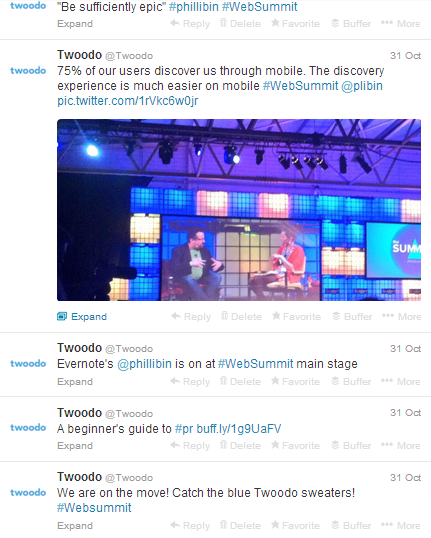This article shows you:
- networking basics with thought leaders and potential investors before a big event
- how that leads to better quality networking at conferences
Our experience with networking at conferences
It was awesome attending the Dublin Web Summit 2014 - we not only attended, but pitched in the ALPHA competition. Where else would we get such an opportunity to make ourselves known? We could stand in front of all the names that we pay homage to in tech, the people who inspire us, the people who make us get up in morning and say “if they can do it, why can’t we?”
In an earlier Web Summit blog post, Noel Ruane laid out some simple, practical advice on meeting investors: don’t waste time with an unknown “investor”, actively try to meet the people most relevant to your business, and don’t go around pitching in people’s face. This is relationship building, not cold calling.
Fantastic advice! But if you are just one of hundreds of hungry startup CEOs with no previous connections to the big names, how do you bridge this gaping network hole? Ideally, you want a steady number of meaningful meetings per conference day set up in advance. So how do you network before a conference?
The key is preparing well in advance (sorry it’s not something sexier than that).
1. Decide if you are going big or going narrow
What do you need right now - advice? €100,000? €1,000,000? Should you spend your time with mentors, angels or VCs? Jot down a clear list of what your startup needs most, and what kind of person would best serve that need. Also calculate how many meetings you can realistically squeeze in per day.
You don’t want to waste your time, and nor do you want to waste the time of someone who cannot help you.
2. Start with the conference attendee list if you have one
First, extract the names you already know you want to meet, and put them aside. The Web Summit had a HUGE list, and it was organized algorithmically to put the people generating most interest at the top. We took the first 75 names with the intention of distilling it down to about 20 - i.e. ten meetings per day. Check the names on your list out on Angel.co, Gust or LinkedIn based on your criteria. If they don’t have a personal AngelList page or their LinkedIn profile is not visible to you, check out their company profile and see if it’s a business and a model you would like some insights on.
Eliminate anyone that has nothing to do with your needs.
3. Go back to the list of people you already know you want to meet.
Check out their AngelList profile and check if they have expressed interest in your industry, and if they are willing to conduct business in a part of the world that suits you. Some quite strictly only deal in the USA, for example.
Even if you love and respect them, only make time for them if they are relevant or you really have time to spare for recreational face-to-face networking.
4. Rinse and repeat step 2
Do this until you have a list of relevant people long enough to fill the time you are spending there.
5. Linking up in advance online
This is the harder part, especially for the most famous names. However, with perseverance, you can get lucky.
- Step 1: decide what you want to ask, and keep it to the point (we went with asking for a quick meeting at the Summit, followed by inviting them to watch us pitch, and to come by the stand if they had the opportunity)
- Step 2: ask to get introduced on LinkedIn/directly request a connection on LinkedIn and send an in-mail. Using LinkedIn came recommended from colleagues of ours as sending an email to people who receive hundreds of emails a day makes it hard to stand out.
- Step 3: send a follow-up message after a day (1 - 2 lines) - we expressed our hope that they have a great time, hope to bump into them, and mentioned our pitch time and location if they would like to check us out
- Step 4: gather Twitter handles, and send them a tweet with your desire to meet up
- Step 5: reminder tweet a day or two later (some of you might complain about this one. Let’s just call it “perseverance” - or go hard, or go home!). And use your personal account, NOT the business account!
- Step 6: ask the conference organizers to set up your “most wanted” connections for you if you have been unsuccessful thus far
- Step 7: hunt for email addresses on their personal blogs or their own companies - you’d be surprised how many you can find!
There are some useful tips on how to find people to contact if you don’t already have a personal wishlist.
6. Once you have your meetings arranged, make your list of questions
Start with the most essential questions and work down by priority. This will help you get the most valuable information before the person gets whisked away by another eager beaver.
Get active on social media in advance of the conference, and use related hashtags on Twitter so that you stand out and get noticed. Participate in online forums and chats with people interested in the event or attending the event (eg. the Facebook page or Twitter):
The important thing is to GET NOTICED!!!
Also check out this thorough guide to networking at conferences for startups from ClarityFM.




